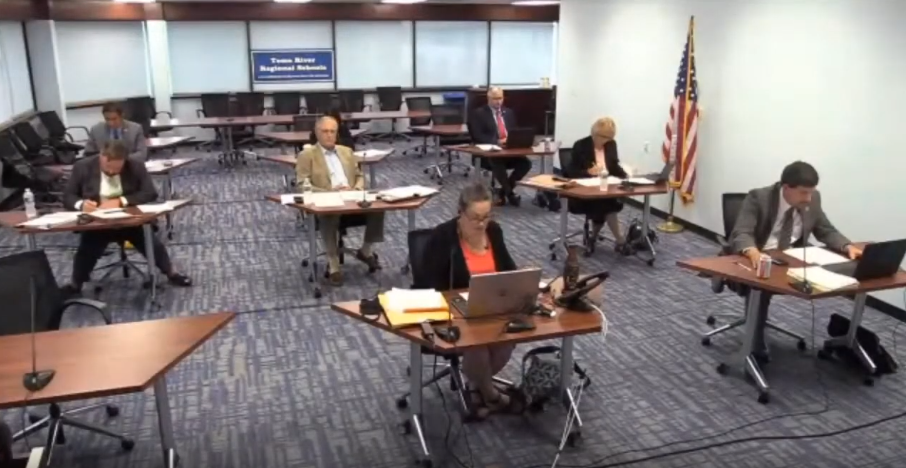
Toms River Regional school board members meet in a videoconference meeting, Sept. 30, 2020. (File Photo)
The Toms River Regional school district voted to declare a formal impasse with the union representing the district’s teachers and some other employees, paving the way for state-mediated negotiations in the future.
District officials said due to the effects of the coronavirus pandemic on the school system and continuing state funding cuts of million of dollars per year, they sought a one-year contract to settle the issue in the short term and begin negotiations for a longer-term contract when the future financial picture became more clear. A number of meetings ensued – the details of which are disputed by both parties – but union leadership ultimately rejected the district’s offer of a 3 percent raise for teachers and a 3.85 percent raise for paraprofessionals (also known as teachers’ aides). The contract would have also added bereavement time for paraprofessionals and reduced mandated professional development training for teachers by one day.
“I always say negotiation is a process – sometimes it’s a longer process that others,” said attorney Bruce W. Padula, who is representing the Board of Education.
Padula said the district, realizing the coronavirus pandemic was here to stay, made its first offer shortly after schools shut down in March.
“On April 1, we gave the association a one-year proposal with a 2 percent increase and some breathing room to get us to a three-year deal,” Padula said.
The board then upped the raise to 2.5 percent and one less professional day, but it was also rejected.
The Toms River Education Association, which represents teachers and some other school employees, sought a 3.8 percent raise, stating their data was based on contracts that had been settled upon by other unions and school districts in Ocean County. The district’s negotiating team, which includes Padula and several non-conflicted board members, disagreed.
“In my experience doing this for 20 years, there are always differences in the numbers the board side gets and what the NJEA provides,” said Padula.
The NJEA provides the local teachers’ union with data on raises, salaries and benefits in similar districts across the state on which to base their proposals. The district uses data from the New Jersey School Boards Association to determine their offer, but the data sets are calculated differently.
After negotiations languished over the summer, Padula said on Aug. 7, the district made their final offer – a 3 percent raise for teachers and a salary increase to $81 per day for paraprofessionals, which translates to a 3.85 percent increase in pay. The TREA, he said, requested a 3.5 percent raise.
“We got to the point where, in my opinion, we were at an impasse,” said Padula. “No side was moving any further. The board could not come up from 3 percent and the association was really not coming down any more from the 3.5 percent.”
Scott Campbell, the TREA president, added his own comments during the public portion of a school board meeting Monday night. He disputes the details of the district’s offerings.
“We had several discussions last Tuesday and Wednesday as to where the TREA stood with the process,” said Campbell. “No offer was made, it wasn’t a proposal, it was just a general conversation. While we still felt we had room for negotiations, after three meetings, the Board of Education decided to file for impasse.”
Campbell called the declaration of an impasse “disrespectful” since, he believed, not enough formal meetings had been conducted.
An impasse means a state negotiator will interview both sides, conduct months of fact-finding and render a recommendation on how to best reach a contract. If one or both sides still rejects the proposal on the table, a process known as “super conciliation” commences, during which both sides hire mediators at their own cost, which can result in marathon, all-night-long negotiating sessions.
“This has been an ongoing thing, and we hoped we would have a contract for our teaching staff before they reported to work tomorrow,” said Board President Anna Polozzo, who is part of the negotiating team. “Unfortunately, this is where we are, and we wanted to make sure we reported that back to the board. We are disappointed that this is where we are on Aug. 31.”
“Covid just added more to this issue,” said Superintendent David Healy, whose chief concern was a reduction in state funding of $5.2 million that had already threatened to eliminate sports and co-curricular programs, as well as lead to layoffs.
“Typically, you never ask for a one-year contract, but there was so much going on just trying to keep our head above water, trying to save athletics, and then Covid hit,” Healy said. “We wanted to put this behind us for one year and be able to focus on opening school, addressing co-curriculars and athletics, prepare for Covid and prepare for the opening.”


Police, Fire & Courts
Toms River Police Catch Well-Known Suspect Attempting to Burglarize Vehicles

Police, Fire & Courts
Fatal Toms River Hit-and-Run Results in Charges Against Local Man, 68

Police, Fire & Courts
Foursome Accused of Dismembering Body Following Murder of Toms River Man







